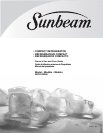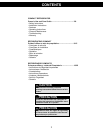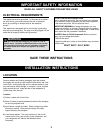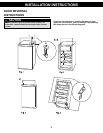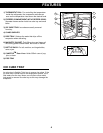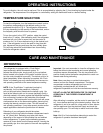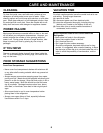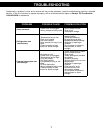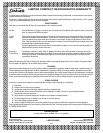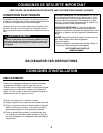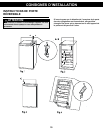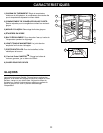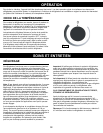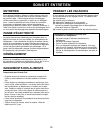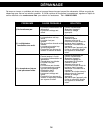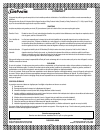
CARE AND MAINTENANCE
CLEANING
To clean the inside, use a soft cloth and a mixture of one
tablespoon of baking soda to one quart of water. Other
cleaning options are a mild soap suds solution, or mild deter-
gent. Wash glass shelves in a mild detergent solution, then
dry and wipe with a soft cloth. Clean the outside with a soft
damp cloth and some mild detergent or appliance cleaner.
POWER FAILURE
Most power failures are corrected within an hour or two and
will not affect your refrigerator temperatures. However, you
should minimize the number of door openings while the
power is off. During power failures of longer duration, take
steps to protect your food by placing dry ice on top of
packages.
IF YOU MOVE
Remove or securely fasten down all loose items inside the
unit. To avoid damaging the leveling legs, turn them all the
way into the base.
VACATION TIME
For short vacation periods, leave the control knob at its nor-
mal setting. During longer absences:
(a) remove all foods.
(b) disconnect power cord from electrical outlet.
(c) clean the refrigerator thoroughly, including drip tray
(defrost pan), located on the bottom of the unit.
(d) leave door open to avoid possible formations of
condensate, mold or odors.
Some Important Rules for the Correct Use of the
Refrigerator
• Never place hot foods in the refrigerator.
• Never place spoiled foods in the unit.
• Don’t overload the unit.
• Don’t open the door unless necessary.
• Should the refrigerator be stored without use for long
periods, it is suggested, after a careful cleaning, to leave
the door ajar to allow the air to circulate inside the unit in
order to avoid the possibility of condensation, mold or
odors.
FOOD STORAGE SUGGESTIONS
Fresh Food Compartment
• Never cover food compartment shelves with aluminum foil
or any other shelf covering material which may prevent air
circulation.
• Always remove porous store wrapping paper from meats,
poultry and fish. Meats should be wrapped individually and
placed in a dish for storage. Wrap fish and poultry in foil or
heavy waxed paper. Most fish should be used the same
day of purchase. Packaged meats such as ham, bacon,
dried beef, or frankfurter, store best in their original pack-
ages.
• Allow warm foods to cool to room temperature before
placing them in the refrigerator.
• Always cover open dishes of food, especially leftovers.
Use leftovers within 2 or 3 days.
6



